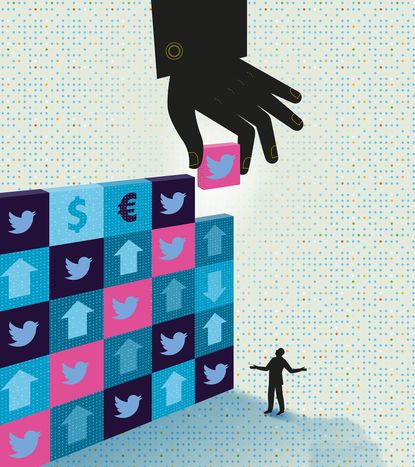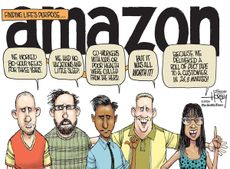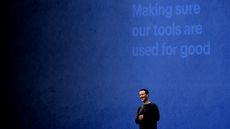Twitter is shockingly inept at cracking down on abuse
It might even hurt their bottom ine


There's no denying Twitter's massive cultural heft. Practically every writer, journalist, celebrity, and comedian is on the platform, and it has partially supplanted professional news organizations as the primary source of breaking news. Whenever something is happening in the world, chances are good that some Twitter user is on the scene, a dozen more are making bad jokes about it.
Yet despite that influence, Twitter has struggled financially. Its experiments in advertising have been lackluster, and as a result its stock price has been on a consistent downward trend for the past two years, falling from a high of $69.00 to $17.81 at time of writing. Its latest proposed experiments in improving the platform, like increasing the character limit from 140 to 10,000, have rather smacked of desperation.
One problem is that though the platform now boasts over 300 million users, growth has sharply slowed over the couple years. It's anyone's guess why it hasn't matched Facebook's tremendous size, but one probable culprit is the platform's extreme vulnerability to harassment and abuse. Stories of random people, particularly women, getting viciously dogpiled by unscrupulous or bigoted tweeters are extremely common. As a result, Twitter has been grudgingly implementing more and more aggressive anti-harassment protocols for its entire lifespan. Yet those protocols themselves may also threaten Twitter's business model.
Subscribe to The Week
Escape your echo chamber. Get the facts behind the news, plus analysis from multiple perspectives.

Sign up for The Week's Free Newsletters
From our morning news briefing to a weekly Good News Newsletter, get the best of The Week delivered directly to your inbox.
From our morning news briefing to a weekly Good News Newsletter, get the best of The Week delivered directly to your inbox.
Permanent banning of an account is the most serious possible punishment Twitter can apply, and it is supposedly reserved for the absolute worst people on the service. Yet Twitter's application of this punishment has been haphazard and inconsistent at best.
There are two basic problems here, it seems. First is consistency. Over the years, several high-profile toxic waste accounts have been permanently banned from Twitter, most famously Charles C. Johnson, the revanchist journalist. This was a move that was widely celebrated, as Johnson was infamous for "doxxing" (posting personal information like home addresses and phone numbers) people he disliked, such as an alleged rape victim (who later was implicated in fabricating her account of the rape), with the obvious intention of getting his readers to harass and threaten them — doubly awful as, in the case of the above example, he supposedly identified the wrong person.
But, however justified the Johnson permaban, it's hard to see it as evidence of a general policy against harassment and abuse. I have personally reported accounts for making specific violent threats against me, and the punishment was for the user to delete the offending tweets and (presumably) promise never to contact me again — not even a temporary suspension. Others have fared even worse:
More seriously, ISIS and al Qaeda have been famously active on Twitter for years, using it to organize, propagandize, and threaten their enemies. It is a genuinely tricky problem for the service, to be fair, but it's hard to see a crackdown on violent threats or abuse when other tweeters plot literal murder conspiracies in plain sight.
That brings me to the second problem with Twitter's enforcement protocols: a lack of due process. While one can email Twitter and beg for forgiveness, there is no formal appeal process whereby one may contest accusations of harassment or abuse. While it's sensible for the subject of a harassment accusation to be unable to see the specific report (it could invite reprisals) having no formal due process is a recipe for unjust suspensions.
Worse, zero due process also means it's quite easy to game the Twitter harassment protocols — ironically making them another weapon for harassers, who report fallacious abuse accusations to get innocent people suspended.
Ultimately, such practices threaten Twitter's viability as a business from two directions at once. Their halfhearted efforts to crack down on harassment and abuse has done little to make the service less of a nightmarish hellscape for too many users, particularly women — but they do raise the risk of innocent people losing their account for little or no reason. It's no surprise many people decide to hang out elsewhere online.
Editor's note: An earlier version of this article mischaracterized the person that Charles C. Johnson allegedly outed. It has since been corrected. We regret the error.
Create an account with the same email registered to your subscription to unlock access.
Sign up for Today's Best Articles in your inbox
A free daily email with the biggest news stories of the day – and the best features from TheWeek.com
Ryan Cooper is a national correspondent at TheWeek.com. His work has appeared in the Washington Monthly, The New Republic, and the Washington Post.
-
 'Republicans want to silence Israel's opponents'
'Republicans want to silence Israel's opponents'Instant Opinion Opinion, comment and editorials of the day
By Harold Maass, The Week US Published
-
 Poland, Germany nab alleged anti-Ukraine spies
Poland, Germany nab alleged anti-Ukraine spiesSpeed Read A man was arrested over a supposed Russian plot to kill Ukrainian President Zelenskyy
By Peter Weber, The Week US Published
-
 Today's political cartoons - April 19, 2024
Today's political cartoons - April 19, 2024Cartoons Friday's cartoons - priority delivery, USPS on fire, and more
By The Week US Published
-
 How do you solve a problem like Facebook?
How do you solve a problem like Facebook?The Explainer The social media giant is under intense scrutiny. But can it be reined in?
By Peter Weber Published
-
 Microsoft's big bid for Gen Z
Microsoft's big bid for Gen ZThe Explainer Why the software giant wants to buy TikTok
By Amrita Khalid Published
-
 Apple is about to start making laptops a lot more like phones
Apple is about to start making laptops a lot more like phonesThe Explainer A whole new era in the world of Mac
By Navneet Alang Published
-
Why are calendar apps so awful?
The Explainer Honestly it's a wonder we manage to schedule anything at all
By Navneet Alang Published
-
 Tesla's stock price has skyrocketed. Is there a catch?
Tesla's stock price has skyrocketed. Is there a catch?The Explainer The oddball story behind the electric car company's rapid turnaround
By Jeff Spross Published
-
 How robocalls became America's most prevalent crime
How robocalls became America's most prevalent crimeThe Explainer Today, half of all phone calls are automated scams. Here's everything you need to know.
By The Week Staff Published
-
 Google's uncertain future
Google's uncertain futureThe Explainer As Larry Page and Sergey Brin officially step down, the company is at a crossroads
By Navneet Alang Published
-
 Can Apple make VR mainstream?
Can Apple make VR mainstream?The Explainer What to think of the company's foray into augmented reality
By Navneet Alang Published